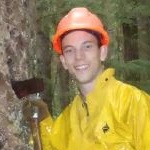
Photo: A. Steven Munson, USDA Forest Service, Bugwood.org
Partner Project News
White and Norway Spruce Genomes Sequenced
Just in case you didn’t see it in last week’s UBC Public Affairs release, the Spruce Marker Technologies for Sustainable Forestry, or SMarTForests project announced some important news – the sequencing of the white spruce and Norway spruce genomes. Called a “mega genome,” the spruce genome contains 20-30 billion base pairs, which is up to 10 times larger than the human genome.
The white spruce genome was sequenced as part of the SMarTForests project, with the results published in Bioinformatics, and SMarTForests project leaders, Dr. Joerg Bohlmann (UBC) and Dr. John MacKay (Université Laval), were co-authors on the Norway spruce paper published in Nature.
Here are some highlights from the release:
“Attempting the sequencing of such a large genome was an incredibly ambitious task and required the development of novel software and innovative use of DNA sequence technology to piece together short DNA sequences to form this massive genome, much like a large jigsaw puzzle,” says Dr. Steven Jones, author of the white spruce genome study, Head Bioinformatics at the BC Cancer Agency Genome Sciences Centre (GSC) and a professor at both UBC and SFU.
“These genome sequences allow us to develop innovative tools for tree breeding, addressing economically- and ecologically-important targets such as insect resistance, wood quality, growth rates and adaptation to changing climate,” says UBC Professor Joerg Bohlmann, co-author of both studies.
“Genome-based marker system could serve to reduce the time of a spruce breeding cycle from currently 25 to as short as five years, and will contribute directly to the competitiveness of the Canadian and Scandinavian forest industry,” says Professor John MacKay of Université Laval, a co-author of both studies.
Led by Dr. Joerg Bohlmann (UBC) and Dr. John MacKay (Université Laval), the SMarTForests project is funded by Genome Canada, Genome BC, Genome Alberta and Genome Quebec. The study was a collaboration between the Genome Sciences Centre, the University of British Columbia, Simon Fraser University, Université Laval, and the BC Ministry of Forests, Lands and Natural Resource Operations.
Do you have any news on your research project that you’d like to share?
Please let us know so we can feature it in our upcoming newsletters.
Internship
genomics.entrepreneurship@UBC recently recruited two commercialization analysts and an apicultural researcher for this summer. Please join us in welcoming all three interns!
Spencer Landsiedel, Commercialization Analyst Intern
 Spencer was born and raised in Abbotsford, BC, where he also completed a Bachelor of Business Administration (Hons) degree in Accounting and Finance at the University of the Fraser Valley. Spencer will be joining the Tree Aggressors Identification using Genomic Approaches (TAIGA) team this summer to create a commercialization-strategy plan by evaluating the potential applications and adoption of this tool in the market and assessing the economic benefits this could return to Canada.
Spencer was born and raised in Abbotsford, BC, where he also completed a Bachelor of Business Administration (Hons) degree in Accounting and Finance at the University of the Fraser Valley. Spencer will be joining the Tree Aggressors Identification using Genomic Approaches (TAIGA) team this summer to create a commercialization-strategy plan by evaluating the potential applications and adoption of this tool in the market and assessing the economic benefits this could return to Canada.
Prior to graduate school, Spencer was a national-level swimmer, competing at the 2008 Beijing Olympic Trials and representing Canada at the 2007 Junior Pan Pacific Championships in Kihei, Hawai’i. While studying for his undergraduate degree, he switched sports and began rowing for the UFV varsity team, achieving top ten finishes at the BC Rowing Championships and the National Rowing Championships. He is actively involved in Net Impact, a global organization of professionals and students committed to sustainable business, and was one of the three organizers of the 11th Annual UBC Net Impact Conference last week. Spencer has worked for the provincial government in a communications role and has significant experience in public speaking and professional presentations.
Outside of the classroom, Spencer writes jazz piano tunes and enjoys gourmet cooking.
Fraser Larock, Commercialization Analyst Intern
 Fraser is a student in the UBC Faculty of Forestry and has completed his third year in the Operations Program, Commerce minor. This summer, Fraser will be conducting similar research to Spencer for the Harnessing Microbial Diversity for Sustainable Use of Forest Biomass Resources (Lignin) project. He is interested in matching the science-based education with business and commerce. Fraser feels that the balance brings him closer to his interest in natural-resource policy and business-related opportunities within the private and public sector.
Fraser is a student in the UBC Faculty of Forestry and has completed his third year in the Operations Program, Commerce minor. This summer, Fraser will be conducting similar research to Spencer for the Harnessing Microbial Diversity for Sustainable Use of Forest Biomass Resources (Lignin) project. He is interested in matching the science-based education with business and commerce. Fraser feels that the balance brings him closer to his interest in natural-resource policy and business-related opportunities within the private and public sector.
Over the previous two summers, Fraser has worked for both the provincial government on an Initial Attack crew fighting wildfires and for a small forest company on Vancouver Island. Initial attack is a first response fire team working with a helicopter to access remote forest areas threatened by fire, while his role within the forest company was to establish harvest areas, record the selection of commercial thinning and track the marketing of volume and value of various log products.
Before attending UBC, Fraser participated in an education of a different kind and travelled throughout New Zealand, Australia and Thailand. While travelling in Tanzania Fraser had the opportunity to contribute to the Ulanga Tree Nursery and the volunteer tree-planting program.
Max MacDonald, Apicultural Summer Researcher
 Max is studying biochemistry at UBC Okanagan and is currently halfway through his undergraduate degree. He has been working at Armstrong Apiaries for the past four summers as a commercial beekeeper and breeder. He anticipates an educational summer in the field working with Next-Generation Integrated Pest Management Tools for Beekeeping (Bee IPM) to obtain a qualitative and socioeconomic perspective on how beekeepers feel about the tools developed by the project researchers. Max looks forward to introducing his commercial practicalities and experience to marker-assisted breeding.
Max is studying biochemistry at UBC Okanagan and is currently halfway through his undergraduate degree. He has been working at Armstrong Apiaries for the past four summers as a commercial beekeeper and breeder. He anticipates an educational summer in the field working with Next-Generation Integrated Pest Management Tools for Beekeeping (Bee IPM) to obtain a qualitative and socioeconomic perspective on how beekeepers feel about the tools developed by the project researchers. Max looks forward to introducing his commercial practicalities and experience to marker-assisted breeding.
Internship Program
genomics.entrepreneurship@UBC will provide funding for internships of four months full-time or the equivalent part-time hours. Interns may receive training opportunities from genomics.entrepreneurship@UBC and mentorship from our Knowledge Network members. For more information on our Internship Program, please visit the Internships page or contact us.
Recent Events

Our Lean Launch Pad Adventure Has Begun!
May to June 2013
The Lean Launch Pad for Genomics program is currently underway with five teams who have signed on for an intensive 8 weeks: “The Winos” (part of Dr. Hennie van Vuuren’s Grape and Wine Genomics project), Lignin, MetaMixis, Easygene and Tait Labs.
The LLP methodology is developed by serial entrepreneur and business school instructor Steve Blank, who believes scientists can transfer their technical expertise to business. How does it work?
Each bi-weekly face-to-face session features instruction and discussion from Sauder School of Business instructor, Iain Verigin, followed by presentations from the five teams. Using the tool, the business model canvas, teams report back on their activities between sessions – who they spoke to and what they learned. The program emphasizes active learning. Teams hypothesize a potential business model for their venture idea, then test it through getting out of the classroom or lab and talking to people – stakeholders, decision-makers, end-users, potential customers.
We asked participants to share their thoughts to date after ‘taking the leap’ with the LLP. Here’s what they had to say:
[The Lean Launch Pad] has been a very stimulating experience…for the scientific mind to think very differently about the same subject in a context of people and business. The workshop is quite challenging which makes it more appealing, at least to me and my team, understanding all these new skills that we’ve never encountered before but that are undeniably necessary not only for a business start-up, but for life in general.
– Carlo Vargas, Winos team
I think the Lean Launch Pad allows scientists to take their product into the next stage of development and help them see how their work can influence/impact society in a commercial environment. This is beneficial not only for the researcher’s current work, but also the process of developing and creating a product in a research setting and bringing it to market in the future.
– Fraser Larock, Lignin team
We are keen to see where this experience takes each team, and we will be sharing more news in upcoming newsletters. The plan is to offer the Lean Launch Pad program again – date yet to be determined – so if you are interested in participating in future sessions, please let us know.
Upcoming Events
Social Media for Science Communication workshop
June 2013
Did you know that the more a research paper gets tweeted, the more likely it is to be cited? genomics.entrepreneurship@UBC will be presenting a Social Media workshop in June to explore the benefits of using Twitter and other platforms to communicate scientific research. Date and details to be confirmed soon. Stay tuned for more information!
More Events
In addition to the workshops hosted by genomics.entrepreneurship@UBC, here are other events of interest on the genomics/entrepreneurship front offered by UBC, Mitacs and other organizations.
Scholar, Blogger, Tweeter, Author: Building Your Academic Profile
June 6th, 2013
Graduate Pathways to Success and UBC Library brings you this workshop to help you communicate your scholarly ideas. Learn about skills and tools for discussing, interacting, presenting, writing, commenting, and finally publishing your research. In this workshop you will develop a scholarly/publication profile using both traditional and social tools, build knowledge of formal and informal modes of publication and identify ways to broadly participate in your field (e.g. webinars, blogs, open education resources). Visit the Graduate Pathways to Success website for more information.
Discovering the Entrepreneur Within
June 11th, 2013
Would you like to be an entrepreneur? Do you have what it takes? Discover the important traits required to be a successful entrepreneur, how to assess risk, what makes a good business plan and how to pitch it! The event is free and open to all graduate students and post-doctoral fellows from all BC post-secondary institutions. Register at Mitacs Step for an informative and interactive full-day workshop.
Basics of Intellectual Property
June 25th, 2013
Mitacs Step and Graduate Pathways to Success is co-hosting this free workshop to raise awareness of intellectual property, by introducing basic concepts, such as its importance and strategic use, types of IP and a list of important resources. The event is free and open to all graduate students and post-doctoral fellows from all BC post-secondary institutions. Visit the Mitacs Step website for more information and registration.
You can view all upcoming events on our Events calendar.
Top Tweets
| @GenomicsTrap | The Importance of Communication; Making Science Accessible http://trap.it/ZU4dTY #genomics #genome |
| @MeetAScientist | How & why should scientists be on social media? We made a highlight video @scicurious @nerdychristie @brossardd http://ow.ly/kzK6I |
| @MeetAScientist | How to turn your science into a picture people will get. Highlight video: http://ow.ly/kzKPX @explainresearch @olsentropy #scicomm |
| @researchimpact | <new blog post> Social Media for Research @caura_acaru http://bit.ly/15naDT7 #KMb Thanks @atomickitty & @KMbeing |
| @researchimpact | New #KMb Journal Club: Scientists who engage with society perform better academically http://bit.ly/16pwcC2 |
 Follow genomics.entrepreneurship@UBC on Twitter.
Follow genomics.entrepreneurship@UBC on Twitter.
Newsletter Subscriptions
If you would like to receive monthly genomics.entrepreneurship@UBC updates and notifications of upcoming events, please sign up here.
genomics.entrepreneurship@UBC is in partnership with Genome BC and Genome Canada.

